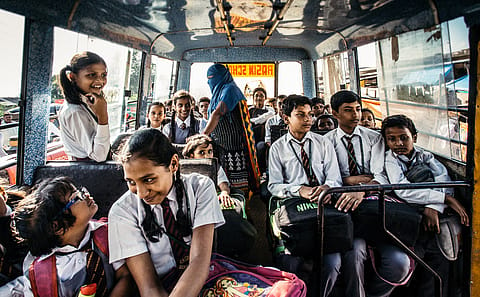India ranks 76th on WEF’s social mobility index
Despite a significant fall in the number of people living in abject poverty, India can improve on providing more equally shared opportunity to its population, says the World Economic Forum.

India ranked 76th among 82 countries on the social mobility index of the World Economic Forum (WEF) on account of its poor performance in improving the quality of and access to education and health. It has one of the highest figures of workers in vulnerable employment, too.
The WEF’s Global Social Mobility Report 2020 said despite a significant decrease in the number of people living in absolute poverty, India has a lot of room for improvement in providing equal shared opportunity. The Nordic countries—Denmark, Norway, Sweden, Finland, Iceland—occupied the top five positions. They all scored more than 82 points, with Finland scoring almost double India’s score of 42.7.
Among the G7 economies, Germany (11) was the most socially mobile with 78 points, followed by France (12). Canada was placed 14th, while Japan, 15th. Among large emerging economies, the Russian Federation was the most socially mobile, ranking 39th with 64 points. China and Brazil were at 45 and 60, respectively.
“In economies such as China and India, economic growth can lift entire populations upward in terms of absolute income, but an individual’s status in society relative to others remains the same,” the report said.
The WEF assessed countries on parameters such as health, education, technology, work, and social protection and inclusive institutions.
Based on low life expectancy and low health access and quality performance, India scored 54.6 on the health pillar, and 41.1 on education access and 31.3 on education quality and equity. In terms of prevalence of malnourishment, India was the worst performer; Ghana, whose overall rank is 70, topped the category. India ranked 76th on the health access and quality index, harmonised learning outcomes index, and the fixed-broadband Internet subscriptions index.
In terms of work opportunities, India has the second-highest level of workers in vulnerable employment in the ranking (76.2%), behind Saudi Arabia and a low female labour participation rate (29.8% of the male labour participation), says the report.
Recommended Stories
India also needs structural reforms to be able to provide fair wages, and its social protection net is very low as compared to its regional peers. India’s overall social expenditure is very low at 2.68% of GDP.
“The combination of these factors is detrimental to the social mobility of its population,” says WEF.
The report also said that if all the economies on the index are able to improve their social mobility score by 10 points, the GDP would increase by 4.4% by 2030 on top of the societal benefits such investments would bring. Low social mobility is also both the cause and consequence of rising inequalities and has adverse consequences for social cohesion and inclusive growth, says the WEF. It will also have a profound effect on future generations as large gaps between parents will result in bigger gaps in access to education and opportunities for children.
“The social and economic consequences of inequality are profound and far-reaching: a growing sense of unfairness, precarity, perceived loss of identity and dignity, weakening social fabric, eroding trust in institutions, disenchantment with political processes, and an erosion of the social contract,” said Klaus Schwab, founder and executive chairman, WEF.
(INR CR)
The forum also believes that technology has had a big impact on inequality as it reduces demand for low-skilled jobs and rewards high-skilled jobs disproportionately, saying “an important contribution to the decline of the labour share of income and polarisation of economic opportunity has been the impact increasingly played by a small group of the most productive firms in each industry, as markets are increasingly dominated by ‘superstar’ firms with high profits and a low share of labour in firm value-added”.
“The response by business and government must include a concerted effort to create new pathways to socioeconomic mobility, ensuring everyone has fair opportunities for success,” Schwab added.